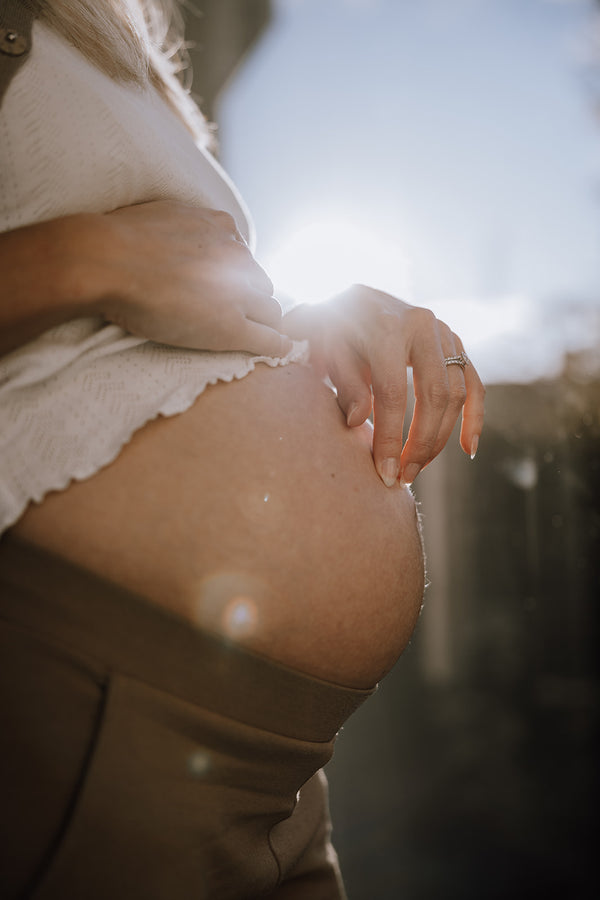When are you due?
We are so happy that you have landed here with us. Perhaps you have just discovered two lines on your pregnancy test, perhaps there is already a little life growing in your belly, or perhaps you are dreaming that it will happen soon. One thing is certain: you are in good and safe hands here. Cana Buttenschøn (Founder of Cana Care) is a trained midwife, has written five best-selling books for pregnant women/mothers, and has developed skin care products focused specifically on the pregnant body and the postpartum period.
On this page, you can easily calculate your due date based on either the first day of your last period, ovulation, or the due date from your scan. Simply enter the relevant information and we will find out when your baby is expected to arrive.
This is often the first thing people ask. Or “How far along are you in your pregnancy?” Questions that may seem quite basic—but to answer them, you need one thing: to know your due date. That's why we've made it easy for you, if you don't already know it, with this due date calculator. Just enter your information below and we'll calculate it for you right away.

Calculate your due date
Find out how far along you are in your pregnancy
Your expected due date is:
Understanding the due date calculator
The thought of becoming a parent can give you butterflies in your stomach, which can feel both exciting and scary at the same time. From the moment you see two lines appear on the test, the questions start pouring in. One of the very first questions is almost always about when you can expect to hold your little one in your arms. This is where the due date calculator comes in.
A due date calculator is one of the finest and most widely used digital tools for expectant parents. Many people, especially in the beginning, feel a great need to calculate, compare, and double-check their due date, and in fact, this is not at all surprising. Knowing when the baby is expected to be born makes the waiting time both shorter and more tangible.
Let's dive into the different ways a due date can be calculated and why calculators have become so indispensable on the road to expanding your family.
The starting point: Last menstrual period
The vast majority of due date calculators are based on the first day of a woman's last menstrual period. This means that if you can remember exactly when your last cycle started, you're in a very good position. The first day of your last menstrual period is considered week 0+0 of your pregnancy, even though fertilization typically occurs about two weeks later.
This may sound a little backwards, but the explanation lies in the body: ovulation, and thus the possibility of fertilization, occurs around the middle of the menstrual cycle, often on day 14 of an average 28-day cycle. Since it can be difficult for most people to say exactly when fertilization took place, healthcare professionals always choose to calculate from the start of menstruation.
By adding 280 days – or 40 weeks – to this day, you arrive at the estimated due date.
Ovulation or fertilization as a starting point
Some women have very precise knowledge of when ovulation occurred – possibly because they have been closely monitored during a fertility treatment. If the day of fertilization is known, the due date calculation can be even more accurate.
Typically, 38 weeks are added to the day of ovulation or fertilization. The reason is that the two ‘extra’ weeks only apply when calculating the due date from the time of menstruation.

WEEKLY EXPERT ADVICE
Pregnancy Care Club
Join our Pregnancy Care Club and receive weekly emails in your inbox with tailored and relevant information about your pregnancy.
Completely free of charge, of course.
The magic of the due date calculator: Why use a digital tool?
Although it can easily be calculated using a calendar and a little math, there is still something special about using an online due date calculator. It is fast, efficient, and very concrete. The visual element also helps to make it all more real.
Most due date calculators ask for the following:
- First day of your last period
- Alternatively: Date of ovulation or fertilization
- Cycle length (especially if it differs from the classic 28 days)
Once the information has been entered, you will quickly receive a due date – and often even an overview of how far along you are week by week. Suddenly, the waiting period becomes concrete and easier to relate to.
It feels as if the pregnancy is already day one in the system, and this often awakens joy, anticipation, and, not least, imagination. Already, your thoughts may wander to all the first clothes, the name to be chosen, and what it will be like to meet a new little person.
Precision and reality: How accurate are due date calculators?
The whole game of due dates is really a kind of guessing game – albeit a relatively qualified one. As we know, nature can be a little less predictable than an app or a calendar.
Statistics show that only 3-5% actually give birth on their calculated due date. However, the vast majority give birth within a few weeks of the expected date, and this is precisely because the body and the baby themselves ‘decide’ when the time is right.
List of factors that can influence when labor starts:
- Genetic factors (family history)
- How many children you have had previously
- Special circumstances during pregnancy (e.g., too much or too little amniotic fluid)
- Exact time of conception
- The baby's size and development
Although due date calculators provide a very good estimate, they are best used as a guideline—not a fixed contract.
When doctor's visits and scans change the picture
At their first doctor's visit or scan, many pregnant women report the first day of their last menstrual period. The doctor or midwife writes this down in the medical record and continues the follow-up schedule from there.
However, during the nuchal scan in weeks 11-14, the baby's size is measured, and the actual due date may sometimes be adjusted. If the fetus turns out to be slightly larger or smaller than the ‘schedule’ indicates, a new due date is given.
This can of course feel confusing if you thought you had the date figured out. But ultrasound measurements provide a picture of exactly how far along the baby is in its development, which is why many people are given a new due date in connection with the nuchal scan, and that is the date that will be considered the most accurate.
Why does the due date feel so important?
The joy of anticipation can be difficult to hold on to amid nausea and fatigue, but having a due date is something many pregnant women return to again and again. It sets the framework for all the family's plans for the foreseeable future.
The due date is often the first day noted in the calendar – and it is the one that family, friends, and even employers ask about.
The time leading up to the big day is spent:
- Planning maternity leave and vacation
- Decorating the nursery
- Buying practical items and making wish lists
- Preparing mentally and perhaps physically for the birth
Since the baby almost never arrives on the exact day, the waiting period is a bit like having Christmas Eve on a schedule where the date can change. It is both beautiful, frustrating, and quite magical.
The importance of the due date calculator for a sense of security
Most people find comfort in knowing when things will happen. Even when it is only an approximate time. Every time the calendar turns a week, it feels like a small milestone, and the waiting period takes on structure.
For many expectant parents, knowing the expected date of birth becomes a source of motivation throughout the months of pregnancy. It reminds them of what it's all about – and gives them the energy to get through the difficult or long days.
The feeling that a digital calculator can put a number on something so big also means that it becomes easier to talk to others about what is going to happen. “It will be around June 15,” you suddenly answer when curious people ask. It creates a sense of unity and makes dreams about the future very real.
At the same time, it's nice to know that you can check in on a due date calculator when you need to calculate and confirm once again – just to be on the safe side.
One of the best things about due date calculators and the constant focus on dates, weeks, and days is that it actually allows room for both certainty and wonder. Pregnancy raises questions, creates expectations, and opens up a love that grows with each passing week. No matter when the little one actually chooses to show up.







